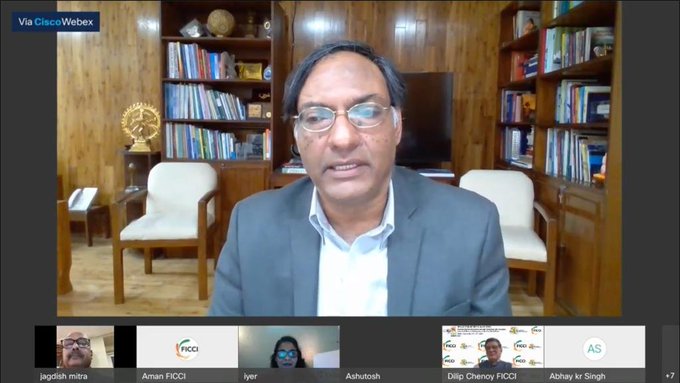Triple Helix – Industry, Academia & Government need to work together: Prof Ashutosh Sharma, Secretary, DST
New Delhi: Prof Ashutosh Sharma, Secretary, DST yesterday said industry, academia and the govt, the Triple Helix, working together as strands woven together happens when there is a single purpose owned by all three.” This, he said is the need of the hour.
Speaking at the Valedictory Session of the Global R&D Summit, organised by FICCI and DST, Prof Sharma said, “DST is working to develop capacity and capability in all areas of science and technology and there has never been a better time for innovation. DST made more incubators and has supported more start-ups in the last five years than in the previous 50.
Addressing the current needs of the industry he said, the MSMEs and Start-Ups are in major need of skilled workers, access to high-end infrastructure, access to market, data, information and knowledge.
“Data is the new raw material, and this is what our industry needs,” said Prof Sharma. We are working on a policy of geospatial data as the whole world has data on India but Indian enterprise has limited access to the same.
Speaking on the current demands of science, academia, and R&D, he said that science needs direction, relevance, and deep understanding of markets. “Atmanirbharta does not mean manufacturing every tiniest part but it means we leverage the best of what is available,” he stated.
Highlighting the government initiatives he said, We have created three knowledge centres called ‘Saathi’ with an investment of INR 125 crores, which will be professionally managed by corporate heads and will be devoted to the MSMEs and Start-Ups. This will be the model that will give access to the industry as partners.
“Our new models for technology missions is that the industry should be fully involved, they should be co-owners of all resources which are being produced,” he said. Great opportunities are coming our way and we must take advantage of the resources which will be possible with these new models, said Prof Sharma.
Mr Sanjeev K Varshney, Head, International Cooperation, DST Govt of India said that Science of today is the technology of tomorrow and it is the technology that redefines our future.
Ms Anandi Iyer, Director, Fraunhofer Office India said, There is a need to create a multi-stakeholder framework to create synergistic relationships, builds strength, fast track the time to market, and create huge value and economic prosperity large.
We need to bring entrepreneurship through a system that reduces time to market and crunches the innovation cycle, focus on enabling policies of the government. “Government needs to be a customer to these industry innovations enabling mobility of researchers and bring start-ups in innovation, focus on demand rather than supply, collaborative relationship and speed of working,” she said. India, she added, has the potential to become the innovation leader in the world.
Mr Sanjay Nayak, Chair, FICCI Science, Technology and Innovation Committee and CEO & MD, Tejas Networks said that there is an absolute need for active collaboration between academicians, researchers and industry at one hand and between countries. “FICCI as a platform would like to be a catalyst for sourcing points for best practices,” he said. “India should adopt the maximum economic and societal impact, including a focus on both applied research as well as basic research, he said.
Mr Dilip Chenoy, Secretary General, FICCI said that the points and suggestions that have emerged from the global R&D Summit on science and technology innovation will find a good fit into the STI policy of the government.
Mr Jagdish Mitra, Chief Strategy & Growth Officer, Tech Mahindra and Co-Chair, FICCI Science, Technology and Innovation Committee moderated the session.
The webinar also witnessed the release of FICCI- Fraunhofer Knowledge Paper- Changing Paradigms: Indian Innovation Ecosystem.

